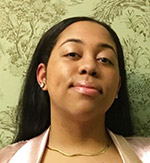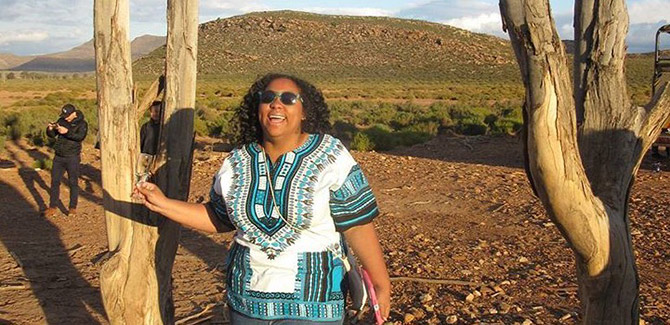My Chance to Explore and Discover Biotechnology
Abbott associate scientist Lachelle Brooks (MS '17) looks back on her time in MBP
Lachelle Brooks (MS '17) admits that she likes to learn a lot of different things at once. When it came to her education, she didn’t want a niche. That is why the Master of Biotechnology program (MBP) at Northwestern Engineering appealed to her. The program offered her the flexibility she craved while placing a heavy emphasis on research.

What was it about MBP that appealed to you?
Although I was an animal science major, I specialized in biological sciences as well. I wanted to find a professional program that allowed me to venture deeper into my love for the biological sciences, but would also allow me to explore different fields I had no experience in yet. MBP provided biological science laboratories, as well as engineering-focused courses and training, plus there were several different certification options that were all very different from the class material. There was plenty of opportunity to explore and discover, so I was sold.
How important was the heavy emphasis on research to you in your decision to attend Northwestern?
The research was the most important factor in my decision, other than the ability to explore fields. I practically lived in the research labs as an undergrad, and I really did not want to lose that aspect of my life. I loved being involved in biological research, and so, finding a program that was heavily research based was important for me.
How would you describe your experience in MBP?
The program was fun but challenging. My biggest challenge was the communication honestly. I was not used to being forced to interact with people, especially not people who were extremely different in personality compared with myself. I was used to having a small group of friends who were similar in attitude and interest. Frequently being placed into groups with people you don't know, for long periods of time, was a wake up call for me. I had to learn that, in my career, I will have to work with people all the time who are nothing like me, and we will have to communicate effectively for anything to get done. I ultimately made a lot of close friends through this program, not just professional colleagues. MBP is responsible for bringing some amazing people into my life.
What were two or three highlights for you from your time in the program?
The first highlight was my research in the Wells Laboratory. Coming from an animal/biological science background, I had no idea what environmental biotechnology was really about. I knew I had transferable laboratory skills, and I knew I had an interest in sustainability. Dr. Wells really took it upon himself to assign me an amazing project with a steep learning curve so that I could get the most out of my research experience, and I always had help from my mentor 24/7. It was extremely rewarding, and I loved the people I worked with.
My second highlight would be the Sustainability and Global Health Biotechnology (SGHB) Certification. Not only did I have the opportunity to take some extremely interesting courses on sustainability and global health, but a couple of my close friends and I had the opportunity to complete our internships at the University of Cape Town in South Africa (The picture at the top of the page is from South Africa). We had an amazing three months, full of learning, challenge and tons of adventure! I chose a sustainability-focused project in Chemical Engineering (yet another opportunity for me to explore things I've never done before). My adviser (Dr. Siew Tai) was extremely hands on throughout my internship and very helpful. I made some amazing friends from all over the world while I was there. I still keep in contact with them, and some have even come to visit me here in Chicago.
On LinkedIn, you say you want to save the world with biotech. What does that mean?
Because biotechnology encompasses so much diversity within the field, I feel that it is one of the best solutions to many world crises. Environmental issues, healthcare and pharmaceutical issues, point-of-care and accessible technological issues are all currently being solved in the field of biotech. Biotechnology is a global phenomenon, in my opinion, and I believe its sole purpose is to put the world on a fast-pace road to recovery. So when I say I want to save the world with biotech, I literally mean that. I want to continue to be a part of a field that is setting its course to solve global dilemmas.
What do you think is the biggest misconception about biotech?
I think a lot of people assume that you must work in a laboratory if you're going into biotech. That's completely false. Outside of the laboratory research, or manufacturing, there are many opportunities in business. Again, here is where biotech shows its diversity.
What are your roles and responsibilities at Abbott?
I'm currently working with a project team focused on transfusion medical technologies. Right now, my laboratory team is focused on the validation and verification of our transfusion immuno-analyzer technology. We're basically the final step before everything is sent off to regulatory agencies (FDA, EU, etc.). So, everything has to be solid before it leaves any of our hands. My responsibilities vary from:
- acquiring biological samples
- biological sample preparation
- testing and screening samples
- assessing the accuracy and precision of our technology
- data analysis
- documentation or any quality assurance verification needed for documentation
- and a lot of things in between.
In my department, it is important to know a little bit of everything. Things move very fast here, and if only one person is the "go-to" person for one thing, we would not be as efficient as we are. So, I wear many hats and nothing is "not my job" here, unless it's something solely for upper management.
In what ways are you able to apply lessons learned in MBP into your day-to-day job at Abbott?
The communication skills I learned are constantly put to use for me. There has to be a lot of clear and constructive communication in order to assure everything is done correctly. I'm typically working in a BSL2 laboratory as well, so many of skills from the biotech labs are still important for me.
What advice would you give a prospective student considering MBP?
Take on a certification! You'll learn so much and have amazing experiences that could be a determining factor in where you want to take your career.


